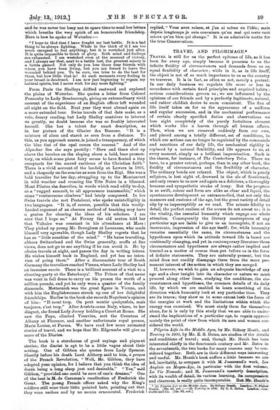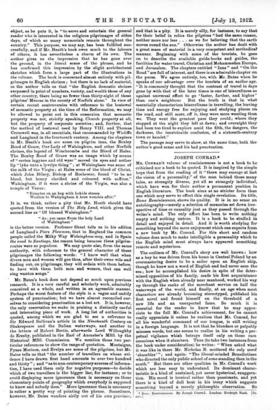TRAVEL AND PILGRIMAGE.*
TRAVEL is still for us the perfect epitome of life, as it has been for every age, simply because it presents to us the infinite fluidity of circumstances and demands from us an equal flexibility of character ; while in it, as in life itself,
the object is not of so much importance to us as the country we traverse. It is in fact, as often as not, merely a pretext. In our daily business we regulate life more or less in accordance with certain fixed principles and acquired habits : serious considerations govern us ; we are influenced by the opinions of our friends and by a perfectly legitimate, natural, and rather childish desire to seem consistent. The flux of life itself' takes on for us the appearance of a uniform and regular succession, and in the mechanical performance of certain clearly specified duties and observations we lose sight completely of the purely fortuitous element which works like a leaven through all human affairs. Then, when we are removed suddenly from our own, and placed among a totally different, set of conditions, in which our actions can no longer be regulated by the commands and sanctions of onr daily life, the mechanical rigidity is' replaced by a natural flexibility, and life appears to us, at every moment, simply as a brilliant improvisation. Such is
the charm, for instance, of The Canterbury Tales. There we
have, to a greater extent, perhaps, than in any other book, the fluidity of circumstances and the flexibility of character.
The ordinary bonds are relaxed. The object, which is purely religious, is lost sight of, drowned in the ale of Southwark, and only recurs to us now and again as a delicious, a thoroughly humane and sympathetic stroke of irony. But the progress is so swift, colour and form are alike so clear and liquid, the spontaneous development so untrammelled, that not only the
manners and customs of the age, but the great variety of detail
slip by us imperceptibly as we read. The minute fidelity to detail, the perfect realism of the scenes'do not arrest us; it is the vitality, the essential humanity which engage our whole attention. Consequently the literary masterpieces of any particular age are liable to give us an incomplete, if not an inaccurate, impression of the age itself; for, while humanity remains essentially the same, its circumstances and the hypotheses upon which its attitude toward life is based are continually changing, and yet in contemporary literature these circumstances and hypotheses are always rather implied and treated as a matter of course than put before us in the form
of definite statements. They are naturally present; but -the mind does not readily disengage them from the more per. manent interest of the action in which they are merged.
If, however, we wish to gain an adequate knowledge of any age and a clear insight into its character or nature we must proceed along other lines, studying the conditions, the sir.
cumstances and hypotheses, the common details of its daily life, by which we are enabled to learn something of the direction which humanity took at any particular time. They are its traces; they show us to some extent-both the force of the energies at work and the limitations within which the energy was exercised. We must study them for themselves alone, for it is only by this study that we are able-to under- stand the implications-of a- particular age, to regain-approxi- mately the point of view from which its men and women con- sidered the world.
Pilgrim Life in the Middle Ages, by Mr. Sidney Heath, and Touring in 1600, by Mr. E. S. Bates, are studies of the details and conditions of travel ; and, though Mr. Heath has been interested chiefly in the fourteenth century and Mr. Bates in the seventeenth, the two books for many reasons may be con- sidered together. Both are in their different ways interesting and useful. Mr. 11-eath'a book suffers alittle bemuse we are led, inevitably, to compare it with M. Jusseramrs work, ,T,,es Anydais au Morn= Age, in particular with the first volume, La Vie Nonsade; and M. Jusserand's masterly deaoription, with its wealth of detail, its various learning, iter ocunpression and clearness., is really quite :incomparable. Bora*, Heath'-, * (1) P.letiel Life ix the Middle Ages. By skimpy Esith. risealortz Plater Unwin. (104. 6d. net..1—(2) Tearing in 1000: By E.-8. Bates. Loudon: Con- stable and Co. [12s. 6d. net.] object, as be puts it, is "to serve and entertain the general reader who is interested in the religious pilgrimages of olden days, of which so many memorials remain throughout the country." This purpose, we may say, has been fulfilled suc- cessfully, and if Mr. Heath's book owes much to the labours of others, it has nevertheless a charm of its own. The author gives us the impression that he has gone over the ground, in the literal sense of the phrase, and he has confirmed this impression by the slight architectural sketches which form a large part of the illustrations in the volume. The book is concerned almost entirely with pil- grimages to English shrines ; but there is no lack of material, as the author tells us that " the English domestic shrines surpassed in point of numbers, variety, and wealth those of any other country, there being no fewer than thirty-eight of these pilgrims' Meccas in the county of Norfolk alone." In view of certain recent controversies with reference to the bestowal of monastic property at the time of the Reformation, we may be allowed to point out in this connexion that monastic property was not, strictly speaking, Church property at all, but the property of corporate societies ; and, further, that the method of bestowal used by Henry VIII. and Thomas Cromwell was, in all essentials, that recommended by Wicliffe and Langland in the fourteenth century. Among the chapters in Mr. Heath's book are some on pilgrim inns, the Boxley Rood of Grace, Our Lady of Walsingham, and other Norfolk shrines, the legend of Winchcombe and the Blood of Hales. The Boxley Rood of Grace was an image which by means of " certen ingynes and old wyer " moved its eyes and nether lip " lyke unto a lyvelye thing " ; at Walsingham was some of the milk of the Virgin ; at Hales some of the blood of Christ, which John Hilsey, Bishop of Rochester, found " to be no blood, but honey clarified and coloured with saffron." Walsingham, if it were a shrine of the Virgin, was also a temple of Venus:
"Ermytes on an hep with hokide statics Wenten to Walsyngham & here wenchis aftir."
It is, we think, rather a pity that Mr. Heath should have quoted from the version of The Holy Land, which gives the second line as Of blessed Walsingham."
" As : yes came ffrom the holy Land
of Walsingham"
is the better version. Professor Skeat tells us in his edition of Langland's Piers Plowman, that in England the common people called the Milky Way Walsingham-way, and in Spain the road to Santiago, the reason being because these pilgrim- routes were so populous. We may quote also, from the same authority, with reference to the general character of these pilgrimages the following words: " I know well that when divers men and women will goe thus, after their owne wile and finding out, on pilgrimage, they will ordain with them before, to have with them both men and women, that can well sing wanton songs."
Mr. Bates's book does not depend so much upon previous research. It is a very careful and scholarly work, admirably conceived as a whole, and written in an agreeable manner. Perhaps the worst feature of the style is a vague and untidy system of punctuation; but we have almost reconciled our- selves to considering punctuation as a lost art. It is, however, the only reservation we make in praising a distinctly useful and interesting piece of work. A long list of authorities is quoted, among which we are glad to see a reference to Sir Edward Sullivan's article in the Nineteenth Century on Shakespeare and the Italian waterways, and another to the letters of Robert Bertie, afterwards Lord Willoughby de Eresby, published in the Earl of Ancestor's MSS. by the Historical MSS. Commission. We mention these two par- ticular references to show the range of quotation. Montaigne, Fynes Morison, and Evelyn are some of the pilgrims, but Mr. Bates tells us that " the number of travellers on whose evi- dence I have drawn first hand amounts to over two hundred and thirty " ; and "as to non-contemporary sources of informa- tion, I have used them only for negative purposes—to decide which of two travellers is the bigger liar, for instance; or to avoid displaying more ignorance than is necessary on those elementary points of geography which everybody is supposed to know and nobody does." More ignorance than is necessary is rather a pretty way of pointing the phrase. Sometimes, however, Mr. Bates wanders airily out of his own province, and that is a pity. It is merely silly, for instance, to say that for their belief in relics the pilgrims " had the same reason, neither more nor less . . . as we for believing that the earth moves round the sun." Otherwise the author baa dealt with a great mass of material in a very competent and methodical manner. Beginning with some of the tourists, he goes on to describe the available guide-books and guides, the facilities for water travel, Christian and Mohammedan Europe, and Jerusalem. The chapters entitled " Inns " and " On the Road "are full of interest, and there is an admirable chapter on the purse. We agree entirely, too, with Mr. Bates when be- speaks of our advantage over the tourists of an earlier age. "It is commonly thought that the contrast of travel in days gone by with that of the later times is one of leisureliness as against universal effort to go faster, farther, and higher' than one's neighbour But the truth is that in what essentially characterizes leisureliness in travelling, the leaving time and energy free for enjoying and studying places on the road, and still more, off it, they were more wanting than. we. They went the greatest pace they could ; where they stopped at the night they left at dawn; and overnight they had been too tired to explore amid the filth, the dangers, the- darkness, the inextricable confusion, of a sixteenth-century town or hamlet."
The passage may serve to show, at the same time, both the anthor's good sense and his bad punctuation.







































 Previous page
Previous page